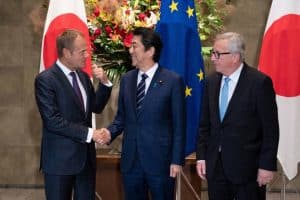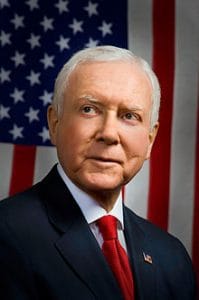
Japanese prime minister Abe, EU Council president Tusk, and EU Commission president Juncker celebrate the signing of the world’s largest free trade pact in Tokyo last Tuesday
Trade correspondent L.C. reports: Japan and the EU signed the EU-Japan Economic Partnership Agreement (EPA) on July 17th in Tokyo. It is the largest bilateral free trade agreement ever concluded, covering over 600 million people and almost a third of world GDP. The two sides also signed a bilateral Strategic Partnership Agreement covering cooperation in a variety of strategic, political, and research/innovation areas, bringing them into closer geopolitical alliance.
At the signing, Japanese Prime Minister Shinzo Abe, European Commission President Jean-Claude Juncker, and European Council President Donald Tusk released statements putting the deal in the context of their desire to lead the world to more open, rules-based trade, a not-so-subtle blast at the current US position. Tariffs were eliminated or reduced on almost all tariff lines – on 99% of them when the deal is fully in force.
TPP and beyond
Japan and the EU are forging other new free trade agreements (FTAs) as well. Japan said this week it expects the abridged Trans-Pacific Partnership (TPP-11) to enter into force early in 2019, about when the EPA will. This week Singapore became the third TPP country to ratify it. The EU is currently in FTA negotiations with Australia, New Zealand, and MERCOSUR and has recently brought into force its FTA with Canada and upgraded FTA with Mexico.
All this is very concerning to US exporters who are losing competitiveness in all these markets. The Japan-EU EPA, however, is the most worrying. US farm exporters, especially ranchers, have long expressed their dismay over the lack of US trade agreements while the EPA and TPP move to implementation and have recently been even more alarmed as countries involved in those deals threaten US agricultural exports with retaliatory tariffs that could cut them out of those markets altogether.
All this motion by US trading partners to conclude deals with each other also will make it harder for the US to conclude new FTAs. The foreign governments will have already undertaken the politically difficult steps to increase access in sensitive areas and won’t have the political space to make new concessions to the US.
US files controversial and disruptive WTO complaints
In a new trade escalation on July 16th, the Trump administration filed World Trade Organization (WTO) complaints against five trading partners, targeting countries that responded to the Section 232 steel and aluminum tariffs with retaliatory tariffs. The countries are China, the EU, Canada, Mexico and Turkey. Other than Turkey, these are four of the US’s five largest export markets. Japan and some other countries have notified the WTO that they reserve the right to retaliate but haven’t yet done so.
Filing the WTO complaints is a big step for the US, heightening its confrontation with allies and creating further problems for the WTO. It also comes as domestic dismay at the Section 232 and 301 tariffs is mounting. It is the first time the WTO’s national security exception will be seriously tested – a test that countries have previously avoided because it could lead either to setting a bad precedent that encourages other countries to act outside of global trade rules by appealing to the exception or to a WTO finding that the US isn’t using the exception properly, which could provoke a strong negative response, even WTO withdrawal. GATT Article XXI, the national security exception, was included in the WTO treaty with the understanding that members would not misuse it to justify protectionism. The situation is also awkward because it pushes close US allies — the EU, Canada, and Mexico — onto the side of China as they will all be defending against the same US attack, making cooperation among these countries to try to change Chinese behavior more difficult.
The US would have been on stronger ground filing defense-related Section 232 complaints had it assessed tariffs, not on aluminum and steel, but on Germany for failing to meet NATO’s 2% GDP defense requirement and for jeopardizing European energy security by concluding its Nordstream 2 pipeline agreement with Russia.
US threatens tariffs on all Chinese exports
In a second major trade escalation, President Trump threatened to hit the entirety of Chinese goods exports to the US with tariffs. This is a remarkable proposal. The US imports about $505 billion in goods from China annually, and no alternative suppliers readily exist. While this step-up in rhetoric might not mean such tariffs will materialize, Treasury Secretary Steven Mnuchin told reporters the day after the President’s comments aired that he “wouldn’t minimize” the possibility that the President might order such a move.
The threat is particularly notable because it came after a week of intensifying opposition to the Section 232 and 301 tariffs. The business/agriculture community and Republican leaders are increasingly blunt in their rejection of the President’s approach. In the case of hitting all Chinese exports, not only would the tariffs hike prices for products needed by industry and consumers, but the retaliation the move would provoke could cause great harm to US companies and interests.
The Fed weighs in
In his appearance before congressional committees this week to deliver his semi-annual monetary policy report, Federal Reserve chairman Powell made clear that the Fed sees economic risks to the President trade policy, and legislators backed him up by speaking of the hardship their constituents are suffering due to the tariff hikes. The Fed has previously reported that it is hearing from around the country of companies abandoning plans for new capital investment due to the tariffs, and this week Powell said, “In general, countries that have remained open to trade, that haven’t erected barriers – including tariffs – have grown faster… had higher incomes… had higher productivity, and countries that have gone in a more protectionist direction have done worse.” He added: “An international rules-based system in which countries can get together” has “served us well.”
Strong opposition to the President’s threat of auto tariffs
The Administration’s escalating trade confrontations were subjected to a barrage of opposition and criticism at other government hearings this week. At a Commerce Department hearing, 45 witnesses from domestic and foreign companies, industry associations, labor unions, and foreign countries spoke. Japan, the EU, Canada, Mexico, the province of Ontario, Turkey, South Korea, Malaysia, South Africa and Taiwan sent representatives to testify, all arguing against the tariffs on their exports and many warning that the US would face serious retaliation. The only testimony supportive of the tariffs came from the United Autoworkers Union.
The US automotive industry is so opposed to the tariffs that they organized a major lobbying campaign, meeting members of Congress this week to push them to oppose the Administration. The cascade of negativity continued as 149 House members of both parties sent Commerce Secretary Ross a letter on July 18th calling on him to drop his department’s investigation, arguing it would be more harmful than helpful to US security.
The alarm over the prospect of more industry-damaging tariffs — which would hit about $350 billion in annual US imports (vehicles and parts) — on top of the impact the Section 232 and 301 tariffs and retaliations have provoked, is so widespread that Democrats are beginning to campaign against the Trump trade policy. In a stunning reversal over the past year, polling shows that Republicans are now much more favorable to trade protectionism than Democrats. But a majority of the population does not believe trade restrictions benefits the economy. This presents an opening for Democratic candidates to use the issue against their opponents.
Will Republicans curb the President’s trade authority?

Senator Orrin Hatch (R-Ut) is the president pro tempore of the US Senate and chairman of the Senate Finance Committee
The biggest threat to the President’s freedom of action may come from Senate Finance Committee Chairman Orrin Hatch (R-UT). In July 17th remarks on the Senate floor, he warned, “If the Administration continues forward with its misguided and reckless reliance on tariffs, I will work to advance trade legislation to curtail presidential trade authority…. I am discussing legislative options with colleagues.” Tariffs, he said, are “a tax on American businesses and consumers,” and imposing them is “closing off international markets.” He urged the President instead to work on the challenges posed by China. This appears, on its face, to be a declaration of intent to support legislation if the President imposes either the Section 232 auto tariffs or the next large tranche of tariffs on China.
Click here to go to the previous Founders Broadsheet post (“Federal Reserve shouldn’t set interest rates”)

Leave a Reply